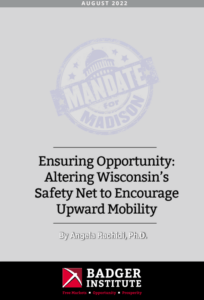Even before the pandemic, U.S. entitlement spending was on an unsustainable path, the growth in means-tested safety net programs far outstripping inflation. The inevitable federal cuts or higher taxes that result will hinder Wisconsin’s aim of helping the poor and vulnerable.
But it creates an opportunity for Wisconsin to demand more authority over federal safety net programs, including a willingness to take a larger funding role while assuming more responsibility.
Poverty scholar Angela Rachidi — an American Enterprise Institute senior fellow and Wisconsin resident who once led policy research at the New York City Department of Social Services — has outlined for the Badger Institute what Wisconsin can do with that added authority.
By her estimates, Wisconsinites receive at least $9 billion a year in federal assistance through means-tested programs, and the state contributes another $3 billion. Proponents want more, advocating for child allowances and universal benefits. Can still more money poured into a flawed system reduce poverty and increase upward mobility? Unless we address underlying causes, namely limited employment and unmarried parenthood, the answer is no.
For decades, the federal government has assumed a larger role in funding and running safety net programs, leaving states with little ability to address flaws such as employment and marriage disincentives and little power to make changes.
State leaders must work to change this.
Specifically, Rachidi recommends that Wisconsin seek from Congress waivers that permit innovations such as:
- Consolidating funding streams for help with food, housing, family support and other programs into a Unified Family Assistance Program. This unified aid should phase out in a coordinated way to minimize benefit cliffs that discourage work.
- Increasing income eligibility requirements under the plan for married families, to stop discouraging marriage.
- Setting and enforcing work and education requirements for receipt of benefits.
- Setting time limits for cash support.
In exchange, Wisconsin would assume a greater share of the cost until we hit agreed-on employment and poverty-reduction benchmarks.
Wisconsin should also encourage or require schools and social service programs to explain the success sequence – finishing high school, working full-time and waiting until marriage to have children – as the demonstrably likeliest way to avoid poverty.





